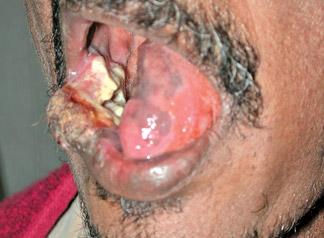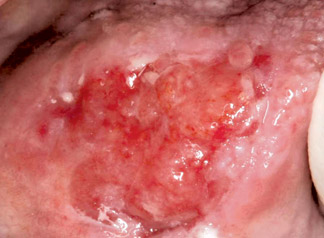|
Awareness programs carried out:
Oral cancer on the rise
By Carol Aloysius
Sri Lanka has one of the world’s highest rates of oral cancer. In
fact, a national study by the Ministries of Health, Education, Labour
and Social Welfare some time ago, rated Sri Lanka as having the highest
incidence of oral cancer globally.
|

Late stage of the mouth cancer, Buccal mocosa, which has
penetrated the overlying skin |
The main causes for this unacceptable level of oral cancer are
smoking, consuming alcohol and betel-chewing. In recent years, many
persons in the prime of their lives in this country have been found to
have become addicted to another cancer causing agent: Babul Beeda which
are small packets of processed arecanuts illegally introduced to the
country, and sold to young adult males including schoolboys.
Concerned health authorities are now carrying out awareness raising
programs among high risk groups to inform them of the dangers of
smoking, drinking and betel chewing and tell them that oral cancer is
preventable and treatable.
The Sunday Observer asked Consultant in Dental Public Health of the
National Cancer Control Programme (NCCP) Dr Hemantha Amarasingha about
how oral cancer is caused and how it can be prevented.
Excerpts of the interview:
Q: Is oral cancer on the rise in Sri Lanka?
A: It is slightly increasing.
Q: What is the percentage of patients?
A: In Sri Lanka, oral cancer is the most common form of cancer among
males and ranks sixth among women, reported to account for 12.9 percent
of total malignancies in the country (National Cancer Control Programme
Sri Lanka 2009). The incidence of cancer of the oral cavity and oro-pharynx,
standardised to the world standard population in 2006, was 16 per 1,000
and four per 100,000 in males and females respectively (National Cancer
Control Programme Sri Lanka 2009).
Q: What age groups are most at risk?
A: Anyone who is engaged in risky habits such as chewing betel,
smoking and consuming alcohol are at risk of getting oral cancer.
Q: How is it caused?
A: Betel chewing using arecanut is the strongest risk factor for
developing oral cancer. Tobacco, arecanut and lime (chunam) have
contributed in different degrees to people developing oral cancer.
Q: What about smoking?
|

Cancer of the tongue |
A: Tobacco smoking and snuff also play a significant role in people
developing oral cancer. Tobacco has been identified as the leading
preventable cause of premature deaths worldwide. It is estimated that
4.9 million people died of tobacco-related illnesses in 2000, and by
2020, this figure is expected to rise to 10 million per year, of which
70 percent will be in developing countries, according to a study
conducted in 2005. Tobacco is a major independent risk factor for the
development of oral and pharyngeal cancer and other malignancies of the
upper aero digestive tract.
Tobacco is consumed in different ways as a form of smoking:
Cigarettes, cigars, hookah, beedi, reverse smoking and smokeless tobacco
such as loose dry oral snuff or in moist snuff packed in small pouches.
Tobacco smoke contains more than 60 carcinogenic combustion products.
Q: Does the consumption of alcohol also contribute to oral cancer?
A: Consumption of alcohol, including so-called binge drinking, is a
major public health problem worldwide. Ethanol and water are the main
components of most alcoholic beverages, which also contain volatile and
non-volatile flavour compounds. Specific alcoholic beverages have been
shown to contain specific impurities or contaminants which can also be
carcinogenic.
Oral cancer in Sri Lanka
* Oral cancer is the commonest malignancy among males in Sri Lanka
and the sixth most common form of cancer among females. It is estimated
to account for 12.9 percent of all cancers occurring in the Sri Lankan
population.
* The age standardised incidence (2006) of oral and oro-pharyngeal
cancer among Sri Lankans is reported as 16 and four per 100,000 among
males and females respectively.
* On average, two to three Sri Lankans die every day due to oral
cancer, which is the highest rate of death among all cancers.
|
N-nitrosodiethylamine is present in some varieties of beer and
whiskey and has been associated with an increased risk of oral cancer.
Polycyclic aromatic hydrocarbons, some of which are considered to be
carcinogenic, are found in many brands of whiskey.
Q: Is oral cancer curable? Is it reversible if detected early?
A: Oral cancer can be cured completely if detected early.
Q: How can it be prevented?
A: Avoid chewing betel, smoking and consumption of alcohol.
Pre-cancer can be cured completely by giving up smoking, avoiding betel
chewing and abstaining from the use of alcohol completely.
Q: How is it treated?
A: Oral cancer needs to be treated with surgery, radiotherapy or
chemotherapy.
Q: Are these methods of treatment available islandwide or only at the
Maharagama Cancer Hospital and a few other hospitals?
A: Cancer treatment centres have been set up in all provinces.
Surgery and chemotherapy facilities are available at all these centres.
Radiotherapy is available only at the hospitals in Maharagama, Galle,
Kandy, Jaffna, Anuradhapura and Badulla.
Q: What is the National Cancer Control Program doing to raise
awareness and stop the spread of oral cancer?
A: The NCCP began a social campaign to raise public awareness and
early detection of oral cancer from July last year, which we are
continuing to conduct islandwide. In addition, we also conduct special
awareness programs for high risk categories as well as schoolchildren
and teachers.
Q: Do you have a message for the public, as today is World Oral
Cancer Day?
A: My message is simply to reiterate what I told you earlier. Anyone
who is smoking, consuming alcohol or chewing betel should stop these
habits. They will not only safeguard their health by doing so, but will
also save a lot of money that they would have to spend on surgery. Those
chewing betel or commercially available arecanut packets daily, please
stop this habit. And get your mouth examined by a dentist immediately.
|



